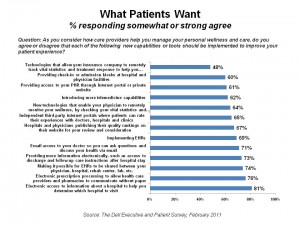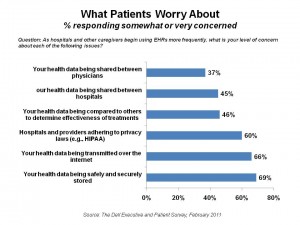 Patients like the idea of advanced health IT, while continuing to be concerned about the safety and security of their personal health data. Dell polled patients and hospital executives on their opinions of health reform, technology, and other health care topics, reported out in The Dell Executive & Patient Survey.
Patients like the idea of advanced health IT, while continuing to be concerned about the safety and security of their personal health data. Dell polled patients and hospital executives on their opinions of health reform, technology, and other health care topics, reported out in The Dell Executive & Patient Survey.
Overwhelming majorities of consumers are inerested in:
- Electronic access to information about a hospital to help determine which hospital to visit (81%)
- Electronic prescription processing (76%)
- Making it possible for EHRs to be shared between physicians, hospitals, and ancillary providers (74%)
- Providing more information electronically such as follow-up care post-discharge (73%)
- Email access to physicians (71%)
- EHRs (69%)
- Quality rankings of hospitals and physicians online (67%)
- Independent 3rd party portals online where patients can rate experiences with doctors and hospitals (65%)
- Remote health monitoring technologies and telemedicine (64% and 62%, respectively), among others.
Dell conducted this survey in fall 2010 among 150 hospital executives and 309 recent hospital patients.
 Health Populi’s Hot Points: As consumers project manage aspects of their lives online, they often think: “where’s my personal online dashboard for health?” Dell’s survey demonstrates plenty of pent-up demand among U.S. health citizens hungry to conduct health transactions online — ever aware of the threat of security for their personal health information (PHI). While 69% of consumers said they were somewhat or very concerned about health data being safely and securely stored, a majority of people want to have electronic access to health information, e-prescribing, email access to physicians, remote health monitoring technologies, PHRs, and other applications that move digitized personal health data from providers’ sites to the consumer’s desktop or mobile device.
Health Populi’s Hot Points: As consumers project manage aspects of their lives online, they often think: “where’s my personal online dashboard for health?” Dell’s survey demonstrates plenty of pent-up demand among U.S. health citizens hungry to conduct health transactions online — ever aware of the threat of security for their personal health information (PHI). While 69% of consumers said they were somewhat or very concerned about health data being safely and securely stored, a majority of people want to have electronic access to health information, e-prescribing, email access to physicians, remote health monitoring technologies, PHRs, and other applications that move digitized personal health data from providers’ sites to the consumer’s desktop or mobile device.
One surprising number in the “What Patients Want” chart is that 1 in 2 patients are interested in remote health technologies provided by their insurance companies. In other surveys, enrollees show a lack of trust of insurance companies beyond the plan function. That one-half of patients said they’d like to see health plans engage in remote health tracking and tailoring care responses shows a relatively high degree of health engagement that, once again, counterbalances consumers’ fears about health plans’ access to PHI.
Are U.S health consumers at the tipping point suggested by Scott McNealy of Sun Microsystems who, in 1999, said, “You have zero privacy anyway. Get over it”? It’s not that simple in health care. 62% of hospitals polled by Dell said they were still somewhat or very concerned with adhering to HIPAA information privacy and security regulations.




 Interviewed live on BNN Bloomberg (Canada) on the market for GLP-1 drugs for weight loss and their impact on both the health care system and consumer goods and services -- notably, food, nutrition, retail health, gyms, and other sectors.
Interviewed live on BNN Bloomberg (Canada) on the market for GLP-1 drugs for weight loss and their impact on both the health care system and consumer goods and services -- notably, food, nutrition, retail health, gyms, and other sectors. Thank you, Feedspot, for
Thank you, Feedspot, for  As you may know, I have been splitting work- and living-time between the U.S. and the E.U., most recently living in and working from Brussels. In the month of September 2024, I'll be splitting time between London and other parts of the U.K., and Italy where I'll be working with clients on consumer health, self-care and home care focused on food-as-medicine, digital health, business and scenario planning for the future...
As you may know, I have been splitting work- and living-time between the U.S. and the E.U., most recently living in and working from Brussels. In the month of September 2024, I'll be splitting time between London and other parts of the U.K., and Italy where I'll be working with clients on consumer health, self-care and home care focused on food-as-medicine, digital health, business and scenario planning for the future...